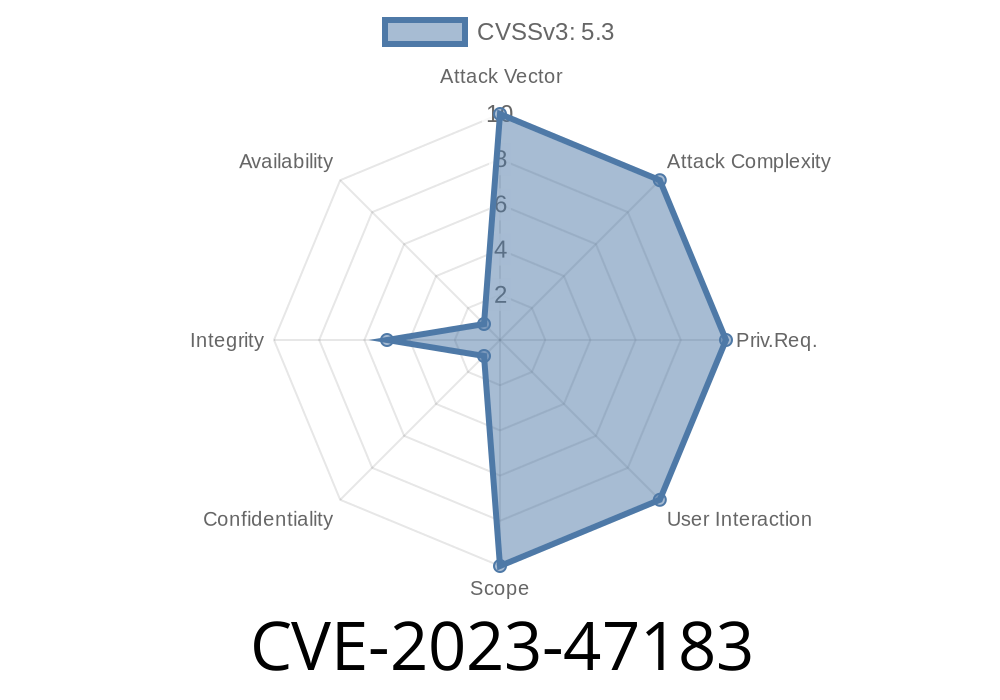GiveWP is one of the most popular WordPress plugins for managing donations, used by nonprofits, charities, and individual fundraisers worldwide. If your website relies on GiveWP, there’s a critical security issue you need to know about: CVE-2023-47183. This post breaks down the vulnerability in plain language, walks through potential exploitation, and provides critical resources for staying protected.
Vulnerability: Missing Authorization in GiveWP
- Impact: Attackers could abuse unprotected endpoints to view or modify sensitive data, steal donations, or disrupt campaigns.
What is CVE-2023-47183?
This vulnerability occurs because GiveWP failed to properly enforce access controls on some of its core features. In technical terms, some API endpoints and URLs within the plugin didn’t check if the user was actually allowed to perform sensitive operations—like exporting donor information, changing settings, or viewing payment details.
In short: Anyone, even an unauthenticated visitor, could potentially access things that were meant to be restricted to admins.
Affected Versions
- Versions: n/a through 2.33.1
That means if you haven’t updated GiveWP since before November 2023, you are almost certainly impacted.
How Attackers Can Exploit This
Let’s look at a simple example. Many plugins register “AJAX actions” in WordPress to respond to requests from users. Properly coded plugins check a user’s permission with functions like current_user_can() or check_ajax_referer() before proceeding.
Here’s a simplified example of what a vulnerable GiveWP function might look like
// A simplified, vulnerable AJAX handler
add_action('wp_ajax_give_export_payments', 'give_export_payments_callback');
function give_export_payments_callback() {
// MISSING: Permission or capability check!
$payments = get_all_givewp_payments();
// Output payment data as CSV:
header('Content-Type: text/csv');
header('Content-Disposition: attachment; filename="payments.csv"');
echo convert_to_csv($payments);
exit;
}
In the real-world, GiveWP had several endpoints like this that didn’t properly check authentication.
An attacker could simply craft a URL like
https://victimsite.com/wp-admin/admin-ajax.php?action=give_export_payments
And, without being logged in, immediately download sensitive payment and donor information.
Proof-of-Concept (PoC) Exploit
Here’s a basic script an attacker could run from their command line to try and steal the payment data:
curl "https://victimsite.com/wp-admin/admin-ajax.php?action=give_export_payments" -o payments.csv
If your site is vulnerable, you might be sending a list of your donor payment data straight into an attacker’s hands.
Original References
- GiveWP Security Advisory: Exploiting Incorrectly Configured Access Control Security Levels (CVE-2023-47183)
- Patchstack Security Advisory on GiveWP
- GiveWP Changelog & Security Updates
Review User Accounts: Check your admin users for any unexpected accounts.
3. Monitor Logs: Look for suspicious downloads or access to sensitive endpoints in your server logs.
4. Set up a Web Application Firewall (WAF): Tools like Wordfence or Sucuri can help detect these attacks.
Lessons Learned
- Authorization checks matter: Always verify that ONLY authorized users can access sensitive data or operations.
- Stay up to date: Vulnerabilities like this are increasingly common, especially in popular plugins.
Audit your plugins: Even trusted plugins can have security flaws.
Summary:
CVE-2023-47183 is a high-impact vulnerability in GiveWP, exposing donation and donor data to anyone exploiting missing authorization. If you use GiveWP, patch now, check your logs, and stay vigilant. Security isn’t a one-time fix—it’s a journey.
Stay secure!
*Want technical details or have questions? Check out the official CVE entry or contact GiveWP support.*
Timeline
Published on: 01/02/2025 12:15:14 UTC
